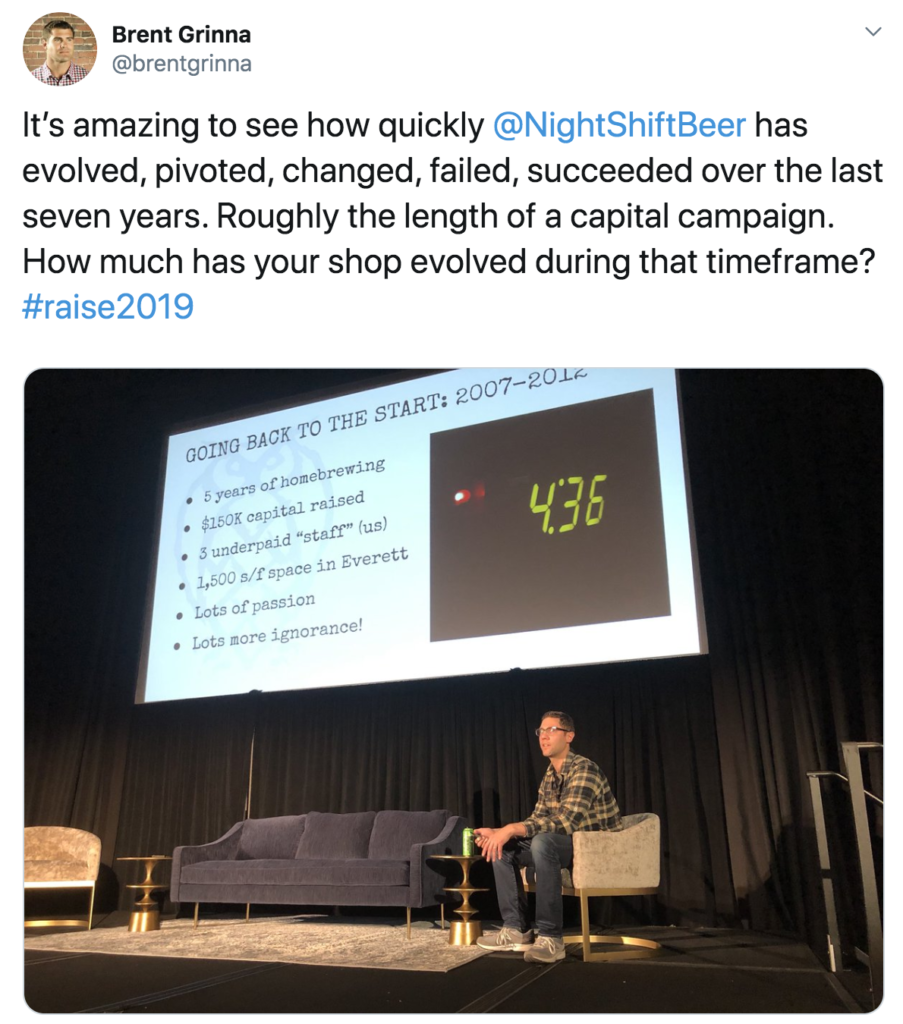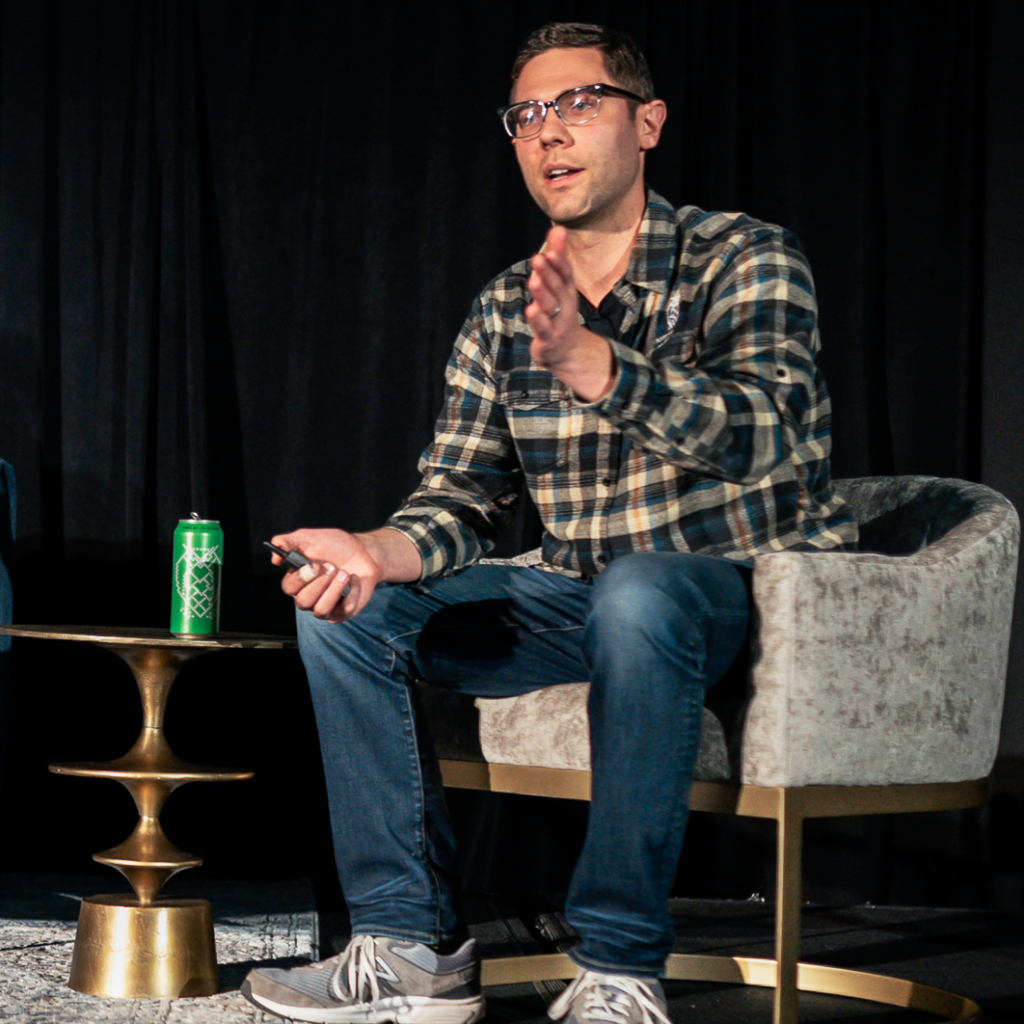
Everyone loves walking into a meeting with their boss to talk about how badly they failed, right? About how they just fell right on their face in spectacular fashion? About a failure people will be talking about for years?
They should.
In fact, the type of failures people talk about for years are exactly the kind you should be striving for.
The failures that keep people talking are exactly the ones that push your organization forward. Just ask the team at Night Shift Brewing in Everett, Massachusetts.
According to co-founder Michael Oxton, they’d be nowhere without failure. Luckily they’ve had plenty of it and business is thriving. As he told RAISE attendees this year, failure is exactly why the brewery is where it is today: It’s wildly popular in the Northeast, growing by the month and their early, wildest dreams pale in comparison to the current state of business.
“The business is night and day from where we started,” Michael said. How so? They started out strictly doing bottles. They said they would focus on off-kilter beers instead of IPAs. They toiled away for long nights brewing in the apartment they shared (hence the name Night Shift).
Now they own intricate canning equipment. IPAs are their biggest product line. They operate multiple locations around Boston with plans in the works to open a huge facility in Philadelphia.

That’s a lot of new stuff they never anticipated doing. “Inherent to doing anything new is going to be failure,” Michael explained. “And accepting that has been the key to so much of our success.”
It’s one thing to not fear failure. It’s a whole other thing to fully embrace it. But with the results-right-now oriented culture we all work in, there are valuable lessons to be learned from Night Shift and how their ability to fail forward got them to where they are today.
Start small
Night Shift didn’t really make this decision consciously, but it’s an important point all the same. It’s hard not to start small when your whole business is three guys brewing beer in one apartment. You’re small by default. It’s easier to accept failure when the stakes are lower and almost no one is paying attention.
“Start small and make a ton of mistakes early on. When you’re small you can make a lot of mistakes. But let’s learn from those. Figure out what’s working, figure out what’s not working. But question everything constantly,” Michael said.
With 200 employees and a portfolio that’s expanded well beyond simply brewing beer, that start small ethos still remains. They’re not messing around too much with their flagship offerings at this point. But they still start small when they can.
It’s how they could experiment with creating a distribution business to liberate craft breweries from onerous and outdated arrangements with traditional distributors. It’s how they could spend a year creating a new line of hard seltzers without hardly anyone even noticing. It’s how they could try their hand at light beer on a lark before realizing it’s actually possible to take a significant piece of the pie dominated by macro breweries.
They fail on the margins. It just used to be that their whole business was the margins. Now those failures in the corners of the business emerge from the shadows to become core to their continued success.
It’s not about failing epically. It’s about turning small failures into epic success.
Create a culture of failure
Don’t get it mixed up: The co-founders of Night Shift are not going around high fiving every employee when they screw something up. But their whole team understands that a calculated failure is not only fine, it’s encouraged.
Michael sums it up nicely. “We’ve embraced failure as an idea. We’ve accepted that that’s what you have to do. And then insisting the team to learn from that and evolve our company. We’re so different now than when we started, which has been key to our success.”
Michael firmly believes that if they hadn’t failed, if they’d continued on with the vision they had when they were just starting out, Night Shift would have experienced the ultimate failure by now: They’d be out of business.
By insisting that the team learn from mistakes and evolve from them, they’ve created a culture that’s inquisitive and experimental. Understanding that a mistake isn’t the end of the world if it’s controlled and in the right environment. That allows the Night Shift team to take risks, recalculate and ultimately grow their ideas into enormous successes.

Examine your failures properly
With all this talk about failure, it might be easy to miss the point. Which is that results are actually beside the point.
When you fail, don’t question the result of the failure. Look further up the chain.
“We try not to assess what our results are, but what our decisions are. And if you question your decision making, we’ve seen it pay off dividends,” said Michael.
Take their new hard seltzer for example. Hard seltzer is on a meteoric rise, as any industry insider or person with eyeballs at a BBQ will tell you. For over a year, Night Shift experimented with their recipe. And, frankly, it wasn’t good. But they didn’t worry about the taste of each batch. They worried about the little decisions that went into producing it. Slowly, by tweaking things here and there, they eventually produced some stuff that they couldn’t be prouder of. And now their craft hard seltzer, like so much else of what they make, is taking off.
How can you replicate Night Shift’s fail forward philosophy? Start on the margins where no one will notice and no one will care (that much). Create an understanding among your team that failure is fine as long as you learn from it. And question the details and decision making that goes into the process, not the results from your experiments.
RAISE 2020 tickets are on sale now and tickets will never be cheaper. Get yours now and join us in July for more ideas just like this.
